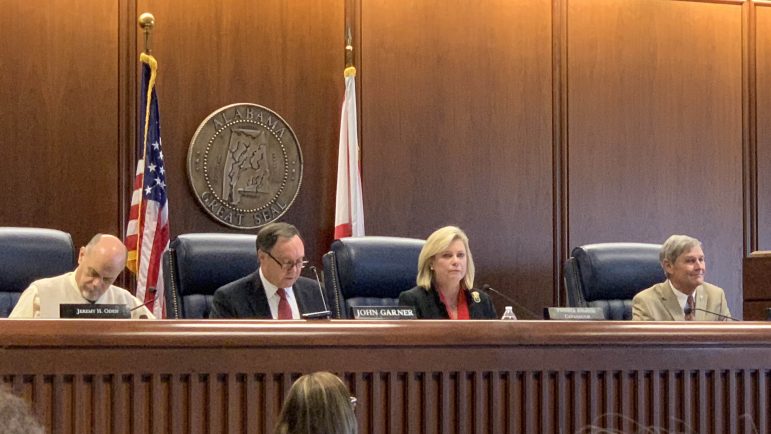When Laura Casey attended a highly-anticipated hearing of the Alabama Public Service Commission (PSC) in November, she wanted to record it for people who couldn’t be there.
“My understanding was that the Open Meetings Act, which is the law of the state of Alabama, allows people to record their public officials in action,” said Casey, who is the Democratic candidate for commission president this year.
But PSC officials ordered her to stop recording and ejected her from the room. Casey filed a lawsuit accusing the commission of violating the state’s Open Meetings Act. In the suit, the PSC said formal hearings are not meetings, so the commission is not required to let people record them. A Montgomery circuit court judge agreed, ruling that because commissioners did not “deliberate” during the hearing, it doesn’t qualify as a “meeting.”
Now the PSC is formalizing that stance and adding additional restrictions with its proposed Media Coverage Plan. Under the new rules, people can not live stream or even update social media during formal hearings. News organizations must request permission to record or photograph at least five days in advance, and all parties involved in the hearing must allow it. Any party can also ask to stop the recording at any time during the hearing.
Frank LoMonte, media law professor at the University of Florida and director of the Brechner Center for Freedom of Information, said the restrictions are similar to those of judicial bodies and trial courts.
“That would be a very unusual and extreme policy for any type of an executive branch agency,” LoMonte said.
He said the Public Service Commission, which regulates state utilities, is governed by Alabama’s Open Meetings Act, whether it is conducting a meeting or a hearing.
“The state Open Meetings Act is very clear that the right to attend the meeting includes the right to non-disruptively make a recording of it,” LoMonte said.
The Alabama Broadcasters Association, Alabama Press Association and AL.com are in agreement. In comments submitted to the PSC, the groups said the commission does not have the legal authority to prohibit recordings or require consent from all parties in a hearing.
“This veto power places unprecedented authority in the hands of a select few persons and is clearly meant to suppress public scrutiny based on a single vote,” the groups wrote.
The PSC adopted the Media Coverage Plan on an interim basis in March, days before hearings began regarding Alabama Power’s proposed $1.1 billion expansion. The commission wrote that it decided to temporarily adopt the plan “after due consideration of the current state of technology and the potential impact that recording and broadcasting can have on formal hearings.” It said the new rules will help “preserve the integrity” of formal hearings.
Laura Casey, who is appealing the trial court’s decision rejecting her lawsuit against the PSC, said the plan further limits transparency of the state’s regulatory agency.
“They are effectively shutting down the Public Service Commission to the public,” Casey said.
The commission will accept comments on the media plan through Friday and will later vote on permanently adopting the rules at a monthly meeting.
PSC officials declined to be interviewed for this story.

